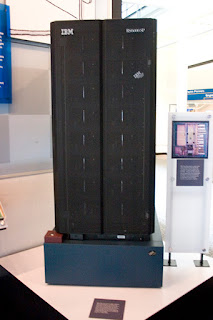n
n
n
n(My answer to this question would be “yes.”)
n
n
n
n(My answer would be an emphatic “no!”)
nDo you like playing chess?
n
n(My answer would again be “no.”)
nChess is a marvelous game that takes intelligence and either a ton of chess know-how or a lot of creativity to play well. The reason I don’t like playing it is because I am not interested enough to learn about openings and strategies and such… So the few times I’ve played, I just tried to think: “Well, if I move this to that space, and then he moves his piece to this space, and then I move this other over here, then I will have checkmate! But if I move this to that space and he moves this other piece to this other space, or if he moves this entirely other piece to this completely different space, or or or or…”
I go around and around with a million different “if this and this and that”s spinning in my head, and I never get to a point when I feel like I know a “good” move.
Well, computers don’t necessarily have that problem. In the 1990s, computer scientists built a super computer that could consider 200 million positions per second!!!
n
n Computers had been solving chess problems and playing chess against human players ever since the 1950s, when computer scientists began considering how to program a computer to do such a complex task. But early attempts could not beat good chess players, so computer scientists continued to enjoy the challenge of building a better chess playing machine.
Computers had been solving chess problems and playing chess against human players ever since the 1950s, when computer scientists began considering how to program a computer to do such a complex task. But early attempts could not beat good chess players, so computer scientists continued to enjoy the challenge of building a better chess playing machine.
n
n
nIn 1967, a computer + program named Mac Hack Six became the first to defeat a person in tournament play.
n
nA decade later, in 1977, Chess 4.6 became the first chess computer to win a match at a major chess tournament.
n
nIn 1981, Cray Blitz became the first computer to beat a master in tournament play – thus becoming the first computer to achieve master rating.
n
nIBM built a massive computer called Deep Thought, and although (in 1988) it could beat human players – even grandmasters and a former world champion – it could not beat the reigning world champion, Garry Kasparov.
n
n So IBM built another chess computer, Deep Blue. And on this date in 1996, it became the first computer to beat the reigning world champ, Kasparov, in Game 1 of a six-game match.
So IBM built another chess computer, Deep Blue. And on this date in 1996, it became the first computer to beat the reigning world champ, Kasparov, in Game 1 of a six-game match.
n
nBut Kasparov went on to defeat Deep Blue in three of the following games, with two draws, so Kasparov won the match.
n
n
n
n
nA year later, an upgraded Deep Blue (sometimes called “Deeper Blue”) became the first chess computer to defeat the reigning world champion (Kasparov).
n
nSince around 2005, computers have been able to regularly defeat even the strongest human players. And nowadays the more intelligent computer systems don’t have to use “brute strength” methods such as analyzing 200 million (200,000,000) positions per second. Instead, they search fewer than 20,000 positions per second.
n
nNow human chess players think of computer systems as ways to analyze games rather than as opponents. Advanced Chess is a form of chess in which human players both have access to computers as they play.
n
n
n
n
n
n
n
n
n
n
n
n
n
n
n
n
n
n
n
n
n
n
n
n
n
n
n
n
n
n
n
n
n
n
n
n
n
n
n
n
n
n
n
n
n
n
n
n
n
n
n
n
n
n
n
n
n
n
n
n
n
n
n
n
n
n
n
n
n
n
n
n
n
n
n
n
n

n
n
n
n
n
n
n
n
n
n
n
n
n
n
n
n
n
n
n
n
n
nPlan ahead:
n
n
n
- n
-
n
-
n
-
nHistorical anniversaries in February
n
n
n
n
n
n
n
- n
-
n
-
n
-
n
n
n
n
n











